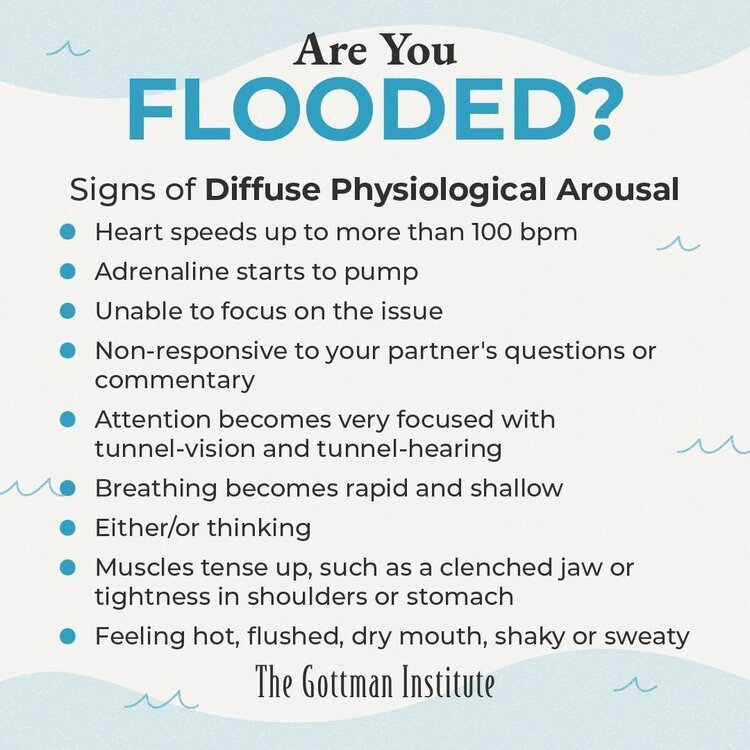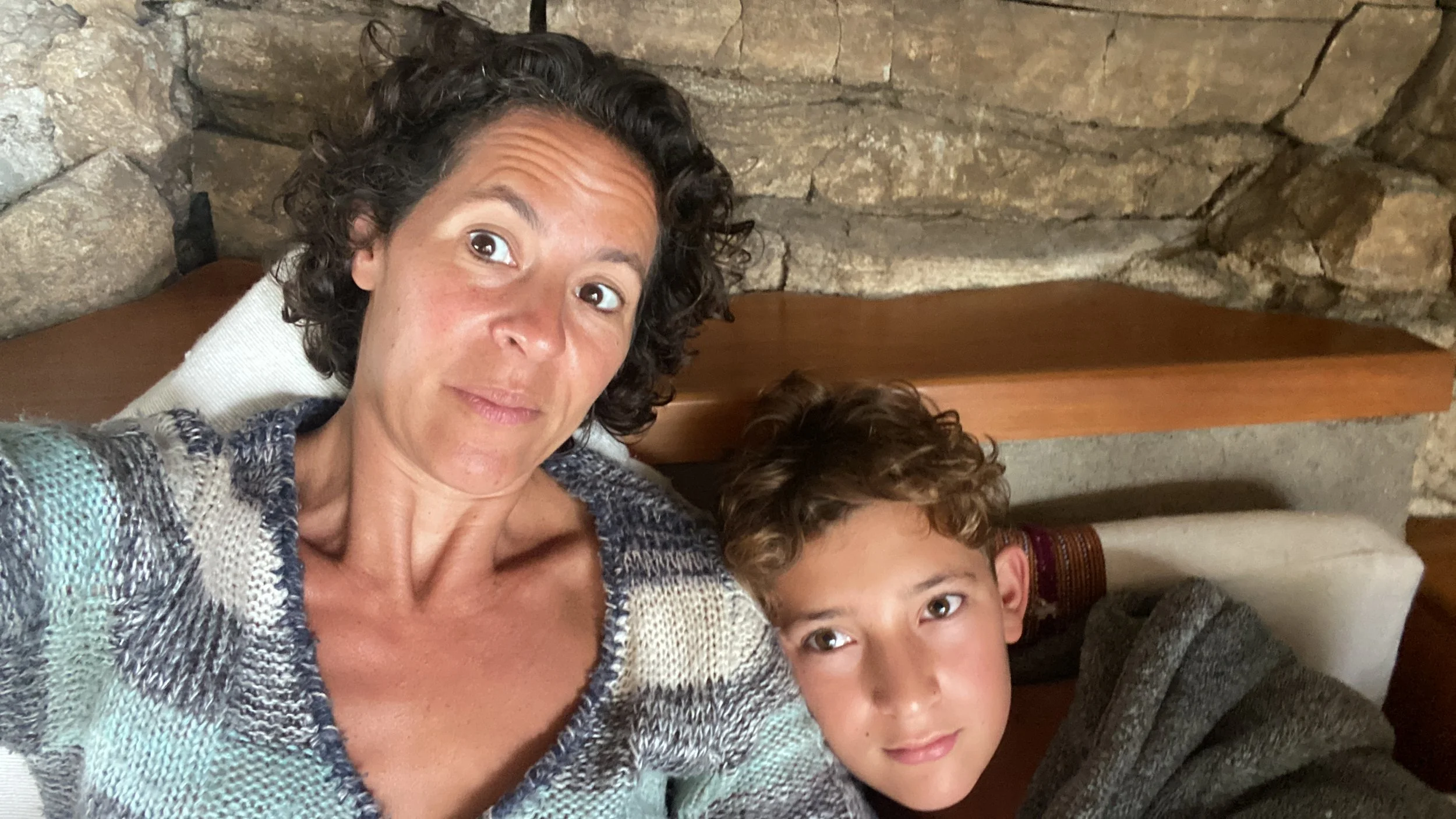Flooding or Diffuse Physiological Arousal
Most couples I see in my practice aren’t dealing with life-threatening situations. Instead, they are navigating chronic relationship disconnection, tension, defensiveness, or irritability that signals danger to their senses. But all of a sudden, it feels like their loving partner has become “the enemy”. They become intensely triggered and overwhelmed with emotion.
Here is the backstory: our nervous system relies on feelings in our body to assess our level of risk and safety. This awareness lies outside of conscious thought. Our brains are wired to provide a continual analysis of information through our senses to decide how and when to initiate and be open to connection with each other.
When we perceive safety, our social engagement systems can function and help us create warmth and connection. When we perceive danger, all our resources move towards assessing the level of danger we may be in and protecting us from it.
This built-in alarm system has a name: Diffuse Physiological Arousal (DPA) or flooding. When your body is in DPA, your heart speeds up, blood flow to your gut and kidneys slows down, adrenaline starts to pump, your throat and chest tighten, you sweat. You breath heavy, and ultimately you head into the infamous “fight or flight” response. It is a physiological overload and a sympathetic nervous system response.
When one partner feels attacked and overwhelmed, it can result in flooding: the rush of physiological stress symptoms results in an inability to think, hear or communicate clearly. The body is focused on defensive protection and not on understanding the other.
Having a logical and productive discussion in this state is nearly impossible. That’s because once flooded, you’re left with the options of fight (act critical, contemptuous, or defensive) or flight (tuning your partner out or stonewalling). When you’re flooded, your ability to process information is reduced. It’s harder to pay attention to what your partner is saying and your ability to creatively problem solve disappears.
We cannot be good listeners when we are flooded. Empathy flies out the window, along with our humor and understanding. Resolving the issue is highly unlikely and continued conversation will probably worsen the situation and result in additional wounding of each other.
If you find yourself flooded, knowing how to self-soothe and bring your physiology back to your baseline is critical. You will need first to disengage from the discussion (without creating more harm) and then physiologically calm yourself.
Learn to recognize the physiological signs of flooding in yourself and in your partner. Feeling defensive? Unable to listen to what your partner is saying? A good indication is your heart rate, which can rise to well over 100 beats per minute when you are in DPA.
STOP the conversation. Tell your partner you need a break from the conflict discussion. It is a good idea to discuss flooding together when you are not in a contentious situation. You can even create a funny code word to use to pause the conversation the next time.
Assure your partner that you will return to the conversation when you’re both ready. This is not an excuse to permanently avoid dealing with the issue. And if you can set a concrete timetable for rejoining the discussion, that is even better (45 minutes, in the evening, tomorrow morning at 8 am). By selecting a definitive time, neither is responsible for chasing the other to finish the discussion.
Take time apart to allow your physiology to return to normal. Things to do:
Find a calm and grounded place where you will have no interruptions, sit comfortably, and start to simply observe what is happening inside. Common experiences may be some of these: pressured thoughts, tight or braced feelings, numbness, no awareness of having a body, pressure or heaviness in the upper chest, and difficulty breathing.
Be curious about what you notice and especially curious to see what happens next.
Bookmark your thoughts. Take your attention to what is arising in the body.
Notice how the bottoms of your feet feel. If you don’t notice anything, press your foot against the floor a little until you notice your leg muscle engage. And be curious to notice what happens next.
Notice your connection to the earth, either through your feet, your hands, or your pelvic bones.
If you have a pet, notice how your pet breaths . . . many pets breathe very deeply and rhythmically into their bellies. Try to match that breathing.
Instead of thinking, use your thinking to remember activities that leave you feeling safe, happy, or relaxed. Remember places where you feel grounded, your favorite memories, and people who make your body smile or relax.
Feel deeply into your present experience: describe and track what happens as you simply observe your body without trying to fix or change it.
Notice thoughts and emotions as they simply flow through your awareness like clouds in the sky. Just observe.
Disengage from unhelpful thoughts while self-soothing. Replaying wounding words, blaming your partner, or holding onto victimhood will just keep you flooded or escalate your flooded state. This is the time to ask yourself, “What do I know that is good and true about my partner?”
Once calm, make an effort to calm and soothe your partner. Once you have calmed yourself, it can be very healing to extend some physical touch or reassuring words to your partner. Decide in advance what sort of overture would be soothing to your partner (and vice-versa) when flooding has occurred.
Revisit the conversation when you both feel calm and ready. A good break to reverse the physiology of DPA lasts at least 20-30 minutes.
Are you looking for help with your relationship? Do you feel that a relationship coach could help you working on your couples skills? Is communication an issue? Have you ever considered couples therapy or counseling? As a psychotherapist and relationship coach, I am uniquely positioned to help you through these moments of disconnect and conflict.
__
Learn more about my approach to life consulting and relationship coaching here or get in touch for your free 30-minute consultation here! Don’t forget to follow along @LilyManne on social for more regular updates!


